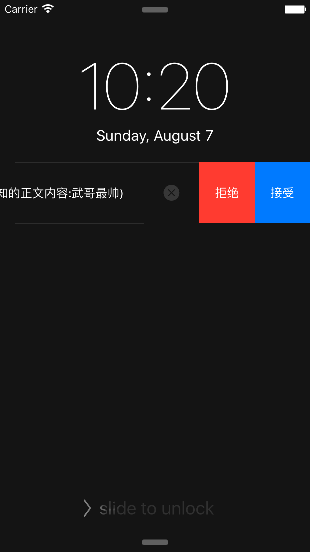苹果在iOS8之后有了全新的通知机制,当我们收到推送的消息时,或者锁屏的时候,让用户快捷的对通知进行操作,实现的效果图如下:

下面我们就来实现这个效果:
首先在页面上添加一个按钮,点击按钮发送本地通知,
UIButton *btn = [UIButton buttonWithType:UIButtonTypeCustom]; btn.frame = CGRectMake(100, 100, 100, 100); btn.backgroundColor = [UIColor yellowColor]; [self.view addSubview:btn]; [btn addTarget:self action:@selector(btnAct:) forControlEvents:UIControlEventTouchUpInside];
按钮实现方法:
- (void)btnAct:(UIButton *)btn{ // 1. 创建消息上要添加的动作,以按钮的形式显示 // 1.1 接受按钮 UIMutableUserNotificationAction *acceptAction = [UIMutableUserNotificationAction new]; acceptAction.identifier = @"acceptAction"; // 添加标识 acceptAction.title = @"接受"; // 设置按钮上显示的文字 acceptAction.activationMode = UIUserNotificationActivationModeForeground; // 当点击的时候启动程序 // 1.2 拒绝按钮 UIMutableUserNotificationAction *rejectAction = [UIMutableUserNotificationAction new]; rejectAction.identifier = @"rejectAction"; rejectAction.title = @"拒绝"; rejectAction.activationMode = UIUserNotificationActivationModeBackground; // 当点击的时候不启动程序 rejectAction.authenticationRequired = YES; // 需要解锁才能处理,如果 rejectAction.activationMode = UIUserNotificationActivationModeForeground; 那么这个属性将被忽略 rejectAction.destructive = YES; // 按钮事件是否是不可逆转的 // 2. 创建动作的类别集合 UIMutableUserNotificationCategory *categorys = [UIMutableUserNotificationCategory new]; categorys.identifier = @"alert"; // 动作集合的标识 [categorys setActions:@[acceptAction, rejectAction] forContext:UIUserNotificationActionContextMinimal]; // 把两个按钮添加到动作的集合中,并设置上下文样式 // 3. 创建UIUserNotificationSettings,并设置消息的显示类型 UIUserNotificationSettings *settings = [UIUserNotificationSettings settingsForTypes:(UIUserNotificationTypeAlert | UIUserNotificationTypeBadge | UIUserNotificationTypeSound) categories:[NSSet setWithObjects:categorys, nil]]; // 4. 注册通知 [[UIApplication sharedApplication] registerForRemoteNotifications]; [[UIApplication sharedApplication] registerUserNotificationSettings:settings]; // 我们使用本地通知为例,介绍如何显示出通知栏 UILocalNotification *notification = [UILocalNotification new]; if (notification != nil) { notification.fireDate = [NSDate dateWithTimeIntervalSinceNow:2]; // 触发时间 notification.alertAction = @"alertAction"; // 定义查看通知的操作名 notification.hasAction = YES; notification.alertBody = @"测试推送的快捷回复(通知的正文内容:武哥最帅)"; notification.soundName = UILocalNotificationDefaultSoundName; // 通知的背景声 notification.applicationIconBadgeNumber = 1; // 强迫症们最讨厌的图标左上角那个小数字 notification.category = @"alert"; notification.userInfo = @{@"key1": @"value1", @"key2": @"value2"}; // 给通知绑定一些处理通知时需要的额外的信息 // 根据触发事件的配置展示通知消息 [[UIApplication sharedApplication] scheduleLocalNotification:notification]; // 立即发送通知到手机 // [[UIApplication sharedApplication] presentLocalNotificationNow:notification]; } }
然后我们需要在AppleDelegate协议方法里面做其他的事情:
// 成功注册通知后,会有回调方法,方法写在AppDelegate里 #pragma mark - 成功注册通知后会调用此方法 - (void)application:(UIApplication *)application didRegisterUserNotificationSettings:(UIUserNotificationSettings *)notificationSettings { // 成功注册registerUserNotificationSetting: 后,回调方法 NSLog(@"成功注册%@", notificationSettings); } #pragma mark - 收到本地推送后调用的方法 - (void)application:(UIApplication *)application didReceiveLocalNotification:(UILocalNotification *)notification { // 收到本地消息后调用的方法 NSLog(@"收到本地消息后调用的方法%@", notification); // 图标上的数字减1 application.applicationIconBadgeNumber -= 1; } #pragma mark - 通知事件处理的回调方法 - (void)application:(UIApplication *)application handleActionWithIdentifier:(NSString *)identifier forLocalNotification:(UILocalNotification *)notification completionHandler:(void (^)())completionHandler { // 在非App页面收到本地消息,下拉消息会有快捷回复的按钮,点击后调用的方法,根据identifier来判断点击的是哪个按钮,notification为消息内容 NSLog(@"%@ --- %@", identifier, notification); if ([identifier isEqualToString:@"acceptAction"]) { NSLog(@"点击了接收按钮"); FirstViewController *firstVc = [[FirstViewController alloc]init]; UINavigationController *naVc = [[UINavigationController alloc]initWithRootViewController:firstVc]; self.window.rootViewController = naVc; }else{ NSLog(@"点击拒绝的按钮"); } // 处理完消息后,最后一定要调用这个代码块 completionHandler(); }
这样就实现了...